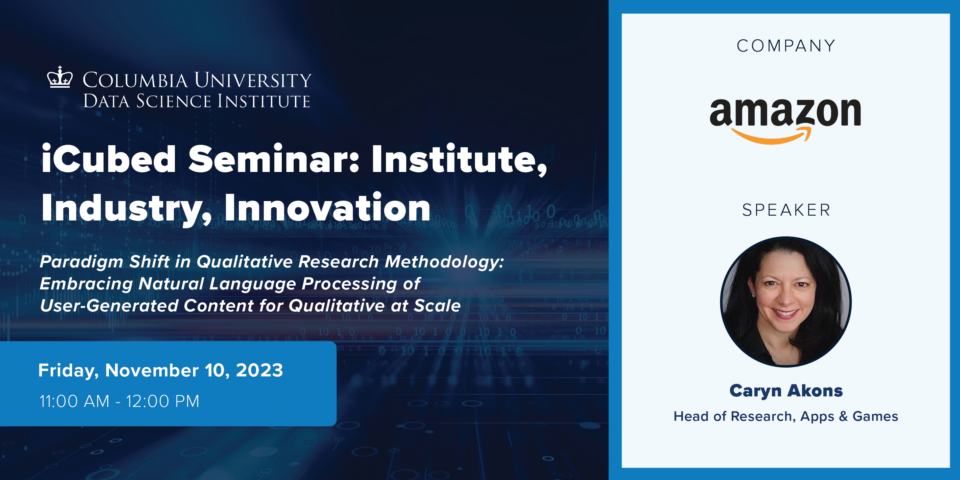iCubed Seminar: Caryn Akons, Head of Research, Amazon (IN-PERSON)
Friday, November 10, 2023
6:00 am - 7:00 am

Friday, November 10, 2023
6:00 am - 7:00 am



Caryn Akons, Head of Research, Amazon
Moderator: Jessica Rodriguez, Industry Engagement and Outreach Officer, Data Science Institute
Location: Davis Auditorium (CEPSR) – 4th Floor (Campus Level) – 530 W 120th St, New York, NY 10027
Abstract: In recent years, the landscape of qualitative research methodology has witnessed a paradigm shift, driven by technological advancements and changing data landscapes. This shift is comparable to the transformative change a decade or more ago, when survey research evolved into big data analytics. The traditional approach to qualitative research, relying on small sample interviews and focus groups, is now being complemented and even replaced by the exploration of user-generated content (UGC) on websites and social media platforms using natural language processing (NLP) techniques.
This shift is rooted in the recognition that online platforms have become rich repositories of authentic, spontaneous, and diverse user expressions, reflecting their thoughts, feelings, and opinions. NLP tools enable researchers to analyze large volumes of unstructured textual data, extracting meaningful insights from the myriad of UGC sources available. This transition parallels the adoption of big data analytics, wherein researchers harnessed the power of vast datasets to uncover patterns, correlations, and trends that were previously unattainable through traditional survey methods.
The comparison between the current paradigm shift and the one a decade ago is multifaceted. Both shifts represent a departure from conventional methodologies, replacing them with data-driven approaches that leverage advanced computational techniques. While big data analytics focused on the aggregation of quantitative data, the current shift emphasizes the nuanced analysis of qualitative content. Moreover, just as big data analytics required new skills in data science and statistical modeling, the utilization of NLP demands expertise in linguistics, machine learning, and data processing. Challenges posed by this new approach mirror those faced during the adoption of big data analytics. Issues related to data quality, privacy, and ethical considerations come to the forefront, necessitating the development of new guidelines and frameworks. Additionally, as with big data, the potential for algorithmic biases and the need for validation and triangulation persist as concerns.
In conclusion, the transition from small sample interviews and focus groups to NLP-driven analysis of UGC marks a significant evolution in qualitative research methodology. This shift, akin to the transformation from survey research to big data analytics, underscores the dynamic nature of research practices in response to technological advancements. Researchers must navigate the complexities inherent in harnessing these new methodologies, ensuring that rigor, validity, and ethical considerations remain central in shaping the future landscape of qualitative inquiry.
Bio: Caryn Akons is Head of Research, Apps & Games at Amazon. Her team’s mission is to elevate the voice of customer (both developers and consumers) to drive Appstore product innovation and engaging experiences on Amazon devices. Prior to Amazon, Caryn was SVP, Research and Insights at Citi. She is an advocate for the value of VOC research, understanding complex behavioral motivations and barriers to drive customer centric design. She is a regular speaker at conferences and to industry groups on the impact and implications of giving the customer a seat at the table.